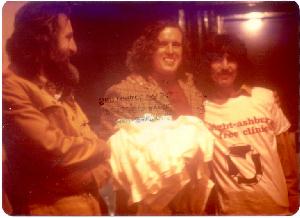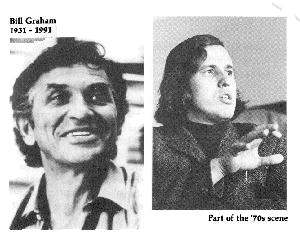Ten Years After
Ten years ago, on October 25, 1991, Bill Graham's helicopter hit
a power line returning from a Huey Lewis and the News concert on a windy Friday
evening at the northern end of San Francisco Bay. With him were Melissa Gold and
Steve Kahn, the pilot.
Bill Graham was a special friend to Rock Medicine and the Haight
Ashbury Free Clinics. At his death, scores of donations poured into the Clinics,
allowing us to create the Bill Graham Center for Health and Recovery, focusing
on treating the addictions that have stolen so many lives from music as well as
more everyday pursuits.
As the organization he built in San Francisco, Bill Graham
Presents, has morphed into SFX and more recently Clear Channel Communications,
we hope that we can continue Bill's passion for taking care of his "house
guests," the patrons at his venues.
The article below, written by David Smith with Leigh Davidson,
appeared shortly after Bill's death, in the December 1991 issue of the Clinics'
newsletter.
We Built This Clinic
on Rock n' Roll
"Bill Graham has given me some of the best times of my
life. The Haight Ashbury Clinic has helped me at one of the lowest times of my
life." So wrote a former patient, sending a donation to the Clinic's Bill
Graham Memorial Fund.
Without Bill Graham, the clinic would not have survived its
fragile infancy in the Summer of Love. Soon after we opened in June 1967,
without any government support, Bill came up to see me at the clinic. We had a
philosophical discussion about the counterculture and social responsibility, and
he indicated he would organize a series of benefit concerts to save our clinic.
We hadn't received some funding that we'd been told would be forthcoming, and
after three weeks' operation we were $700 in debt.
At the same time, we were absolutely overwhelmed with people on
bad trips, with sexually transmitted diseases and minor epidemics of measles,
mono-nucleosis, strep throat and the flu. We also treated any number of other
maladies arising from the crowded, unsanitary living conditions of many
neighborhood residents.
Bill donated his staff and the Fillmore Auditorium for a benefit
concert on July 13, 1967. The Charlatans, Blue Cheer, and Big Brother and the
Holding Company played -- many of the bands' members were Clinic patients. Over
two thousand people came to that concert, and we received five thousand dollars,
a monumental sum in those days.
(Photo of Rick Seymour, Dr Dave and George Harrison)
In 1970, Bill organized a Creedence Clearwater Revival benefit
to help us start the Detox program. In 1974, the incredible George Harrison and
Ravi Shankar concert helped us expand into the building at 1696 Haight Street.
Bill's favorite Clinic program was Rock Medicine. In the spring
of 1973, he staged two consecutive Saturday concerts at Kezar Stadium featuring
The Grateful Dead and Led Zeppelin. He asked us to staff a "medical
emergency care tent" during both concerts. These small stadium concerts --
about 18,000 at the Dead and 25,000 at Led Zeppelin -- evolved into his Days on
the Green. The "medical emergency care tent" became Rock Medicine.
Bill Graham and the Clinic thus pioneered a concept still not
fully recognized -- event medicine. Bill always felt that patrons at his
concerts were his guests who should be provided with good entertainment in
clean, safe surroundings. If they were hurt or sick, he had Rock Medicine on
hand to provide medical care and psychological reassurance. Even his performers,
security, production staff and the concert hall's employees have come to rely on
Rock Medicine's volunteers. Returning the patient to his family and friends as
quickly as possible, minimizing the need for hospitalization or law involvement,
has been the watchword.
As drug use became more destructive in the music community, Bill
called the Clinics often for referrals to treatment centers and information
about drug effects on behalf of his musicians. Bill understood the pressures on
performers but he wouldn't support their craving to self-destruct.
Bill's relationships were very personal. He loved his family and
the Clinics were part of his extended family. In recent years, as the Clinics'
fundraising efforts have become more organized, Bill Graham lent his name as
Chair to the Annual Dinner and "Love Needs Care" auction.
As we enter our twenty-fifth year of serving those who have few
places they can turn to, we mourn that our good friend, our benefactor, cannot
share our future and our pride in our survival. We are privileged to have
participated in his twenty-five years of providing good times and great memories
to millions. Cheers, Bill.